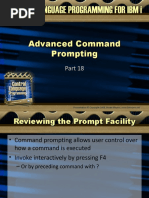Qsysopr Break Handling Program Tv
How to Take Apart TV: Do you have an old TV or monitor lying around in your house? You don't want it and planing to throw it away? You can make good use of its parts! Taking apart a TV or a monitor may sound easy, but they can be very dangerous if you are. Totse.com - The alt.2600 FAQ file on hacking, including loops, - The alt.2600 FAQ file on hacking, including loops, password shadowing and interesting ftp and telnet sites. 'Program Break' is the name given to the insertiles and promos that would air in between each program on PBS. This is a playlist of all the program breaks I have uploaded from my recordings.
- Qsysopr Break Handling Program Tv Free
- Qsysopr Break Handling Program Tv Series
- Qsysopr Break Handling Program Tv Online
I would like my C++ code to stop running if a certain condition is met, but I'm not sure how to do that. So just at any point if an if statement is true terminate the code like this:
14 Answers
There are several ways, but first you need to understand why object cleanup is important, and hence the reason std::exit is marginalized among C++ programmers.
RAII and Stack Unwinding
C++ makes use of a idiom called RAII, which in simple terms means objects should perform initialization in the constructor and cleanup in the destructor. For instance the std::ofstream class [may] open the file during the constructor, then the user performs output operations on it, and finally at the end of its life cycle, usually determined by its scope, the destructor is called that essentially closes the file and flushes any written content into the disk.
What happens if you don't get to the destructor to flush and close the file? Who knows! But possibly it won't write all the data it was supposed to write into the file.
For instance consider this code
What happens in each possibility is:
- Possibility 1: Return essentially leaves the current function scope, so it knows about the end of the life cycle of
osthus calling its destructor and doing proper cleanup by closing and flushing the file to disk. - Possibility 2: Throwing a exception also takes care of the life cycle of the objects in the current scope, thus doing proper cleanup..
- Possibility 3: Here stack unwinding enters in action! Even though the exception is thrown at
inner_mad, the unwinder will go though the stack ofmadandmainto perform proper cleanup, all the objects are going to be destructed properly, includingptrandos. - Possibility 4: Well, here?
exitis a C function and it's not aware nor compatible with the C++ idioms. It does not perform cleanup on your objects, includingosin the very same scope. So your file won't be closed properly and for this reason the content might never get written into it! - Other Possibilities: It'll just leave main scope, by performing a implicit
return 0and thus having the same effect as possibility 1, i.e. proper cleanup.
But don't be so certain about what I just told you (mainly possibilities 2 and 3); continue reading and we'll find out how to perform a proper exception based cleanup.
Possible Ways To End
Return from main!
You should do this whenever possible; always prefer to return from your program by returning a proper exit status from main.
The caller of your program, and possibly the operating system, might want to know whether what your program was supposed to do was done successfully or not. For this same reason you should return either zero or EXIT_SUCCESS to signal that the program successfully terminated and EXIT_FAILURE to signal the program terminated unsuccessfully, any other form of return value is implementation-defined (§18.5/8).
However you may be very deep in the call stack, and returning all of it may be painful..
[Do not] throw a exception
Throwing a exception will perform proper object cleanup using stack unwinding, by calling the destructor of every object in any previous scope.
But here's the catch! It's implementation-defined whether stack unwinding is performed when a thrown exception is not handled (by the catch(..) clause) or even if you have a noexcept function in the middle of the call stack. This is stated in §15.5.1 [except.terminate]:
In some situations exception handling must be abandoned for less subtle error handling techniques. [Note: These situations are:
[..]
— when the exception handling mechanism cannot find a handler for a thrown exception (15.3), or when the search for a handler (15.3) encounters the outermost block of a function with a
noexcept-specification that does not allow the exception (15.4), or [..][..]
In such cases, std::terminate() is called (18.8.3). In the situation where no matching handler is found, it is implementation-defined whether or not the stack is unwound before std::terminate() is called [..]
So we have to catch it!
Do throw a exception and catch it at main!
Since uncaught exceptions may not perform stack unwinding (and consequently won't perform proper cleanup), we should catch the exception in main and then return a exit status (EXIT_SUCCESS or EXIT_FAILURE).
So a possibly good setup would be:
[Do not] std::exit
This does not perform any sort of stack unwinding, and no alive object on the stack will call its respective destructor to perform cleanup.
This is enforced in §3.6.1/4 [basic.start.init]:
Terminating the program without leaving the current block (e.g., by calling the function std::exit(int) (18.5)) does not destroy any objects with automatic storage duration (12.4). If std::exit is called to end a program during the destruction of an object with static or thread storage duration, the program has undefined behavior.
Think about it now, why would you do such a thing? How many objects have you painfully damaged?
Other [as bad] alternatives
There are other ways to terminate a program (other than crashing), but they aren't recommended. Just for the sake of clarification they are going to be presented here. Notice how normal program terminationdoes not mean stack unwinding but an okay state for the operating system.
std::_Exitcauses a normal program termination, and that's it.std::quick_exitcauses a normal program termination and callsstd::at_quick_exithandlers, no other cleanup is performed.std::exitcauses a normal program termination and then callsstd::atexithandlers. Other sorts of cleanups are performed such as calling static objects destructors.std::abortcauses an abnormal program termination, no cleanup is performed. This should be called if the program terminated in a really, really unexpected way. It'll do nothing but signal the OS about the abnormal termination. Some systems perform a core dump in this case.std::terminatecalls thestd::terminate_handlerwhich callsstd::abortby default.
As Martin York mentioned, exit doesn't perform necessary clean-up like return does.
It's always better to use return in the place of exit.In case if you are not in main, wherever you would like to exit the program, return to main first.
Consider the below example.With the following program, a file will be created with the content mentioned.But if return is commented & uncommented exit(0), the compiler doesn't assure you that the file will have the required text.
Not just this, Having multiple exit points in a program will make debugging harder.Use exit only when it can be justified.
Jonathan LefflerPeople are saying 'call exit(return code),' but this is bad form. In small programs it is fine, but there are a number of issues with this:
- You will end up having multiple exit points from the program
- It makes code more convoluted (like using goto)
- It cannot release memory allocated at runtime
Really, the only time you should exit the problem is with this line in main.cpp:
If you are using exit() to handle errors, you should learn about exceptions (and nesting exceptions), as a much more elegant and safe method.
jkeysjkeysreturn 0; put that wherever you want within int main() and the program will immediately close.
Qsysopr Break Handling Program Tv Free
Evan CarslakeEvan CarslakeQsysopr Break Handling Program Tv Series
The program will terminate when the execution flow reaches the end of the main function.

To terminate it before then, you can use the exit(int status) function, where status is a value returned to whatever started the program. 0 normally indicates a non-error state
chrisbunneychrisbunneyEither return a value from your main or use the exit function. Both take an int. It doesn't really matter what value you return unless you have an external process watching for the return value.

If you have an error somewhere deep in the code, then either throw an exception or set the error code. It's always better to throw an exception instead of setting error codes.
nhahtdhGenerally you would use the exit() method with an appropriate exit status.
Zero would mean a successful run. A non-zero status indicates some sort of problem has occurred. This exit code is used by parent processes (e.g. shell scripts) to determine if a process has run successfully.
shA.tBeyond calling exit(error_code) - which calls atexit handlers, but not RAII destructors, etc.- more and more I am using exceptions.
More and more my main program looks like
where secondary_mainin where all the stuff that was originally is put --i.e. the original main is renamed secondary_main, and the stub main above is added.This is just a nicety, so that there isn't too much code between the tray and catch in main.
If you want, catch other exception types.
I quite like catching string error types, like std::string or char*, and printing those in the catch handler in main.
Using exceptions like this at least allows RAII destructors to be called, so that they can do cleanup. Which can be pleasant and useful.
Overall, C error handling - exit and signals - and C++ error handling - try/catch/throw exceptions - play together inconsistently at best.
Then, where you detect an error
or some more specific exception type.
If your if statement is in Loop You can use
If you want to escape some code & continue to loop Use :
continue;
If your if statement not in Loop You can use :
Qsysopr Break Handling Program Tv Online
To break a condition use the return(0);
So, in your case it would be:
Dude.. exit() function is defined under stdlib.h
So you need to add a preprocessor.
Put include stdlib.h in the header section
Then use exit(); wherever you like but remember to put an interger number in the parenthesis of exit.
for example:
If the condition I'm testing for is really bad news, I do this:
This gives me a nice coredump from where I can examine the situation.

protected by Community♦Jul 31 '17 at 6:19
Thank you for your interest in this question. Because it has attracted low-quality or spam answers that had to be removed, posting an answer now requires 10 reputation on this site (the association bonus does not count).
Would you like to answer one of these unanswered questions instead?
The most common release is 1.0, with over 98% of all installations currently using this version.  During setup, the program creates a startup registration point in Windows in order to automatically start when any user boots the PC. A scheduled task is added to Windows Task Scheduler in order to launch the program at various scheduled times (the schedule varies depending on the version).
During setup, the program creates a startup registration point in Windows in order to automatically start when any user boots the PC. A scheduled task is added to Windows Task Scheduler in order to launch the program at various scheduled times (the schedule varies depending on the version).